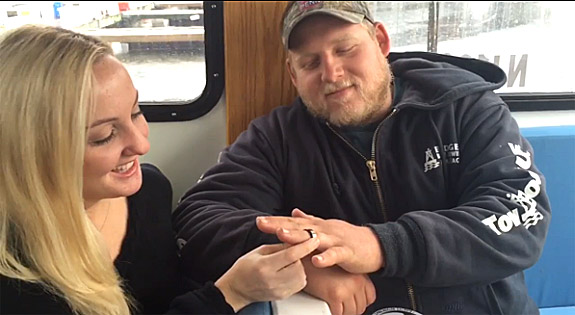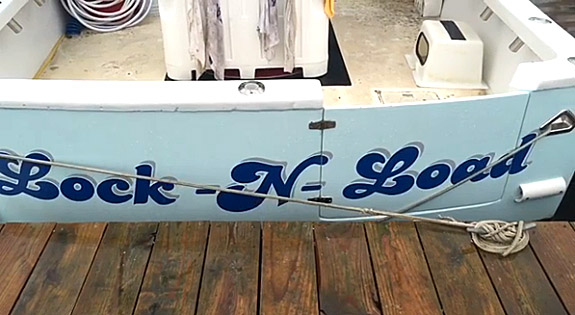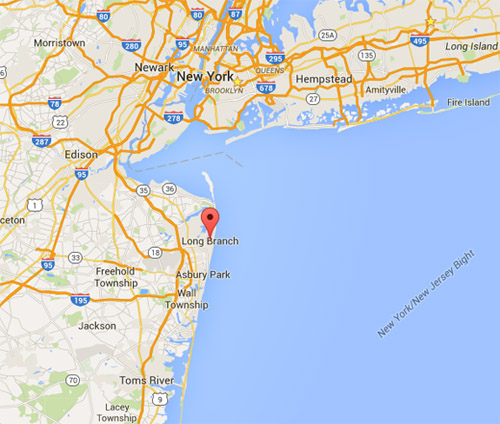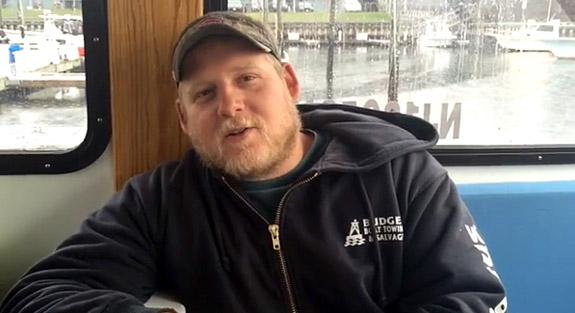December 29th, 2015
Newlywed Jay Bradford was working on his friend's charter boat off the coast of New Jersey when his tungsten wedding band slipped off his finger and disappeared into the Atlantic Ocean. But thanks to the accuracy of GPS tracking and the skills of a seasoned salvage diver, the ring was found on the ocean floor four days later. Bradford's wife, Meagan, is calling the recovery "a Christmas miracle."

Meagan had picked a tungsten carbide wedding band for her seafaring husband because her local jeweler told her the metal was extremely durable and resistant to scratches. After their June wedding, Jay wore it everyday and never took it off — until Saturday, December 12.

Jay had been helping out on his friend's charter boat, the Lock-N-Load, when he was asked to pull up the anchor so they could find a better fishing spot. In an interview with the Asbury Park Press, Jay described how he hit the boat's bow rail with his hands and the wedding band rode up over his knuckle. When he tried to secure it, the ring jumped off his hand, rebounded off the boat's toe rail and plunked into the 33-foot-deep water.

The conditions were far too dangerous for captain Nick Barsa and his crew to try to recover the ring at that moment, so they locked in the boat's GPS coordinates just in case they decided to tackle the problem with a professional diver at a later date.
Even though the tungsten ring could easily have been replaced, the Point Pleasant couple was steadfast in their commitment to do everything possible to recover the original.
"I wasn't worried about the cost of the ring," Meagan told the Asbury Park Press. "I was more concerned with what it meant and what it symbolized."
“We knew it was a 50-50 shot and [Jay] asked me if I though it was worth it,” Meagan added. “I told him we would either have a really good story to tell or be back at square one.”

After four days of bad weather, and with the seas still churning, captain Barsa, Jay and a professional salvage diver returned to the exact GPS coordinates, east of Long Branch, N.J. To have a fighting chance of finding the ring, the boat had to be placed in the exact same spot, a task made very difficult by the 35 MPH westerly winds and a big southeast swell. Captain Barsa had to circle the boat several times to hit the mark.
The Global Positioning System (GPS) is a satellite-based navigation system that provides accurate position fixes 24 hours a day, on land, sea and air, in any weather, with no subscription or fee. Originally built between 1978 and 1994 for the U.S. Department of Defense with 24 satellites in orbit 12,000 miles above the Earth, this multi-billion dollar system is available for all users.
And, amazingly, it's often accurate to within 3.5 meters.
The diver, Mark Thompson, stood in the same position on the boat where Jay had lost his ring and dropped a handful of metal washers into the water to determine where the current was likely to take them. Then, the diver followed the popcorn trail to the spot where the tungsten ring was likely to be. Amazingly, the strategy worked to perfection. Despite only one-foot of visibility at the bottom, it took barely 10 minutes for Thompson to find the black tungsten ring resting near the washers on the rocky bottom.
“I gave [the diver] the biggest hug I could,” Meagan said.

Jay promised his wife that he wouldn't wear his tungsten wedding band to work anymore. Instead, he'll wear a cheap imitation or rubber ring. Meagan joked that Jay wants to tattoo his finger with the ring's GPS coordinates so he won't ever "have to go through this again."
Meagan called the experience a "Christmas miracle," and nicknamed the Lock-N-Load's skipper "Captain St. Nicholas" in honor of his holiday season efforts to recover her husband's wedding band.
Credits: Video screen captures via Asbury Park Press (APP.com), Google Maps.

Meagan had picked a tungsten carbide wedding band for her seafaring husband because her local jeweler told her the metal was extremely durable and resistant to scratches. After their June wedding, Jay wore it everyday and never took it off — until Saturday, December 12.

Jay had been helping out on his friend's charter boat, the Lock-N-Load, when he was asked to pull up the anchor so they could find a better fishing spot. In an interview with the Asbury Park Press, Jay described how he hit the boat's bow rail with his hands and the wedding band rode up over his knuckle. When he tried to secure it, the ring jumped off his hand, rebounded off the boat's toe rail and plunked into the 33-foot-deep water.

The conditions were far too dangerous for captain Nick Barsa and his crew to try to recover the ring at that moment, so they locked in the boat's GPS coordinates just in case they decided to tackle the problem with a professional diver at a later date.
Even though the tungsten ring could easily have been replaced, the Point Pleasant couple was steadfast in their commitment to do everything possible to recover the original.
"I wasn't worried about the cost of the ring," Meagan told the Asbury Park Press. "I was more concerned with what it meant and what it symbolized."
“We knew it was a 50-50 shot and [Jay] asked me if I though it was worth it,” Meagan added. “I told him we would either have a really good story to tell or be back at square one.”

After four days of bad weather, and with the seas still churning, captain Barsa, Jay and a professional salvage diver returned to the exact GPS coordinates, east of Long Branch, N.J. To have a fighting chance of finding the ring, the boat had to be placed in the exact same spot, a task made very difficult by the 35 MPH westerly winds and a big southeast swell. Captain Barsa had to circle the boat several times to hit the mark.
The Global Positioning System (GPS) is a satellite-based navigation system that provides accurate position fixes 24 hours a day, on land, sea and air, in any weather, with no subscription or fee. Originally built between 1978 and 1994 for the U.S. Department of Defense with 24 satellites in orbit 12,000 miles above the Earth, this multi-billion dollar system is available for all users.
And, amazingly, it's often accurate to within 3.5 meters.
The diver, Mark Thompson, stood in the same position on the boat where Jay had lost his ring and dropped a handful of metal washers into the water to determine where the current was likely to take them. Then, the diver followed the popcorn trail to the spot where the tungsten ring was likely to be. Amazingly, the strategy worked to perfection. Despite only one-foot of visibility at the bottom, it took barely 10 minutes for Thompson to find the black tungsten ring resting near the washers on the rocky bottom.
“I gave [the diver] the biggest hug I could,” Meagan said.

Jay promised his wife that he wouldn't wear his tungsten wedding band to work anymore. Instead, he'll wear a cheap imitation or rubber ring. Meagan joked that Jay wants to tattoo his finger with the ring's GPS coordinates so he won't ever "have to go through this again."
Meagan called the experience a "Christmas miracle," and nicknamed the Lock-N-Load's skipper "Captain St. Nicholas" in honor of his holiday season efforts to recover her husband's wedding band.
Credits: Video screen captures via Asbury Park Press (APP.com), Google Maps.



